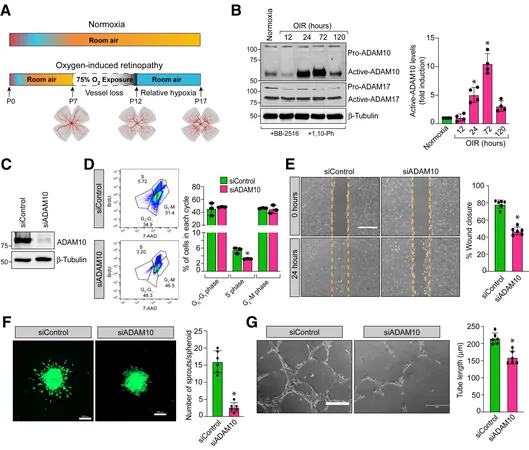
Revolutionary Study Reveals ADAM10 Protein as Key Player in Vision-Threatening Retinal Disorders
2025-06-24
Author: Jia
Groundbreaking Research Unveils ADAM10's Role in Retinal Health
A game-changing study has spotlighted the endothelial cell-specific protein known as ADAM10, revealing its crucial function in managing abnormal blood vessel growth in damaged retinas—a leading cause of vision loss and impairment.
Impressive Findings with Big Implications
Published in The American Journal of Pathology, this research offers profound insights into the pathophysiology of neovascular disorders such as retinopathy of prematurity and diabetic retinopathy, hinting at a potential new target for groundbreaking treatments.
Understanding ADAM10: The Versatile Protein
ADAM10 is a multifaceted protein that plays vital roles in various cellular processes, including regulating cell surface protein expression and facilitating intercellular communication. While its role in normal blood vessel formation is well-known, its involvement in proliferative retinopathies, linked to vision loss, has not been thoroughly explored—until now.
Delving into the Molecular Mechanisms
The study employed an endothelial-specific ADAM10 knockout mouse model to investigate how ADAM10 signaling contributes to pathological neovascularization in the retina. The results could reshape our understanding of how to treat retinal disorders.
Key Discoveries from the Research Team
Leading the charge, Dr. Nikhlesh K. Singh from Wayne State University, stated, "Our findings revealed a significant elevation of ADAM10 in injured retinas. Reducing ADAM10 levels slowed down the growth and formation of new blood vessels in human retinal microvascular endothelial cells, demonstrating its critical role in retinal diseases."
Impact of Ephrin B2—The Protein Tied to ADAM10
The researchers further uncovered that ADAM10 governs the expression of Ephrin B2 in endothelial cells. Reduced levels of Ephrin B2 were directly linked to impaired growth and function of retinal endothelial cells, highlighting a vital interaction in the formation of new blood vessels within the retina.
Addressing Vision Loss in Common Retinal Conditions
Pathological retinal neovascularization leads to significant vision loss in conditions like diabetic retinopathy and age-related macular degeneration. Current treatments often involve invasive procedures with limited effectiveness, such as anti-VEGF therapies that can induce severe side effects.
Toward Innovative Treatment Strategies
In a noteworthy statement, co-researchers Shivantika Bisen and Purnima Gogoi pointed out, "Existing anti-VEGF treatments can lead to serious health issues like neuronal damage and heart problems, and not all patients respond to these therapies. Our findings suggest that targeting ADAM10 and its pathways, like Ephrin B2, could present new strategies for managing pathological retinal conditions."
A New Era for Retinal Disorder Treatments?
Dr. Singh concluded, "Our research opens the door to understanding the complexities of hypoxic and ischemic retinal diseases and emphasizes potential therapeutic targets that could revolutionize treatment approaches, moving beyond the current anti-VEGF strategies. This exploration of ADAM10 and its effects marks a significant step forward in our battle against vision loss."


 Brasil (PT)
Brasil (PT)
 Canada (EN)
Canada (EN)
 Chile (ES)
Chile (ES)
 Česko (CS)
Česko (CS)
 대한민국 (KO)
대한민국 (KO)
 España (ES)
España (ES)
 France (FR)
France (FR)
 Hong Kong (EN)
Hong Kong (EN)
 Italia (IT)
Italia (IT)
 日本 (JA)
日本 (JA)
 Magyarország (HU)
Magyarország (HU)
 Norge (NO)
Norge (NO)
 Polska (PL)
Polska (PL)
 Schweiz (DE)
Schweiz (DE)
 Singapore (EN)
Singapore (EN)
 Sverige (SV)
Sverige (SV)
 Suomi (FI)
Suomi (FI)
 Türkiye (TR)
Türkiye (TR)
 الإمارات العربية المتحدة (AR)
الإمارات العربية المتحدة (AR)